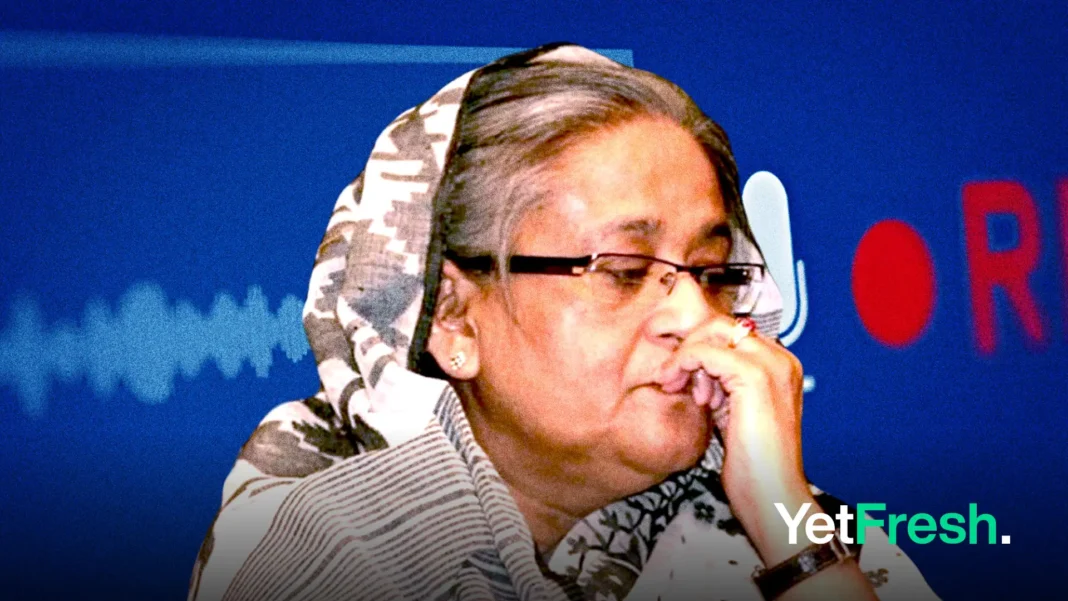Summary:
- The International Crimes Tribunal (ICT) has ordered a forensic investigation into call recordings involving former Prime Minister Sheikh Hasina, linked to the July-August 2024 massacre.
- Prosecutors presented evidence of enforced disappearances and killings during the student-led uprising, accusing agencies of destroying crucial proof.
- Sheikh Hasina fled to India on August 5, 2024, and now faces multiple arrest warrants for genocide, crimes against humanity, and enforced disappearances.
- The interim government and ICT are pursuing accountability for atrocities committed during Hasina’s 15-year rule, with international attention on the ongoing investigations.
The International Crimes Tribunal (ICT) of Bangladesh has ordered a forensic investigation into call recordings involving former Prime Minister Sheikh Hasina, as part of an ongoing probe into the July-August 2024 massacre. The tribunal, chaired by Justice Md Golam Mortuza Mojumdar, issued the directive on January 13, 2025, following the submission of critical evidence by prosecutors. This evidence includes call recordings and details of enforced disappearances and killings during the student-led uprising that ultimately led to Hasina’s resignation.
Prosecutor BM Sultan Mahmud confirmed that the forensic analysis aims to authenticate the recordings obtained from various sources. Prosecutor Tanvir Hasan Joha highlighted that significant evidence points to efforts to destroy proof of the atrocities. The ICT has also criticized certain agencies for their lack of cooperation in providing information crucial to the investigation.
Sheikh Hasina fled to India on August 5, 2024, amidst escalating protests against her administration. These protests, initially sparked by dissatisfaction with government job quotas, evolved into a nationwide movement demanding her resignation. The uprising resulted in widespread violence, with estimates of fatalities ranging from hundreds to over a thousand, including children and opposition members. Human rights organizations and international bodies have since called for accountability for enforced disappearances and extrajudicial killings under Hasina’s regime.
The ICT has already issued two arrest warrants against Hasina. The first, in October 2024, accused her and 45 others, including prominent Awami League leaders and her son Sajeeb Wazed Joy, of genocide and crimes against humanity during the protests. A second warrant was issued on January 6, 2025, targeting Hasina and 11 others for enforced disappearances. Among those implicated are former defense adviser Maj Gen (retd) Tarique Ahmed Siddique and ex-Inspector General of Police Benazir Ahmed.
The July-August massacre has been described as one of the darkest chapters in Bangladesh’s recent history. Reports indicate that security forces and ruling party affiliates were involved in violent crackdowns on protesters, leading to significant casualties. A United Nations investigation confirmed at least 650 deaths during this period, while local estimates suggest over a thousand fatalities. Additionally, thousands were injured or detained, with many subjected to enforced disappearances.
The interim government led by Nobel laureate Muhammad Yunus has taken significant steps toward justice and accountability. It established a commission to investigate enforced disappearances and signed the UN Convention for the Protection of All Persons from Enforced Disappearance in August 2024. The commission has identified eight secret detention centers allegedly used during Hasina’s rule and documented over 1,600 complaints of enforced disappearances.
The ICT’s actions reflect growing demands for justice from victims’ families and civil society groups. Prosecutors have emphasized the importance of fair trials to rebuild trust in Bangladesh’s judicial system and ensure accountability for crimes committed during Hasina’s tenure. As investigations continue, international observers are closely monitoring developments to ensure transparency and adherence to human rights standards.
Source: TBS News




